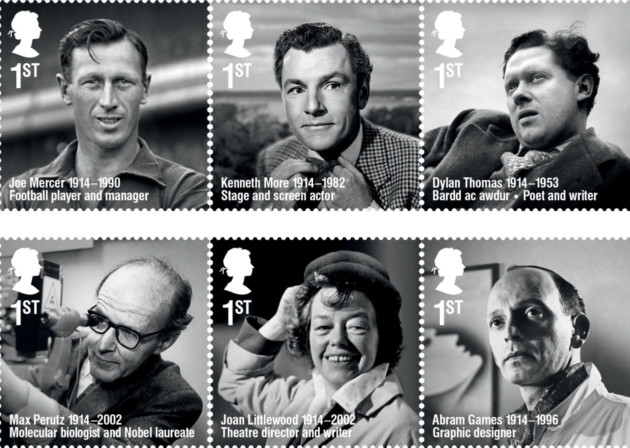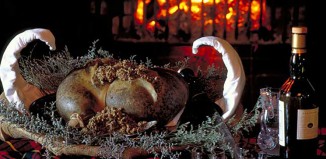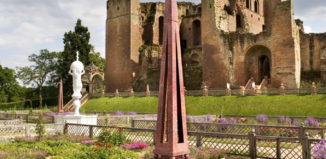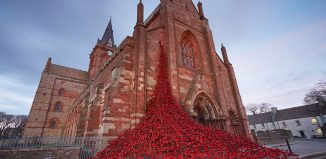Ten remarkable lives celebrated in new royal mail stamp set
Royal Mail celebrates 10 remarkable individuals from the realms of sport, design, economics, heroism and the arts with the ‘Remarkable Lives’ stamp issue.
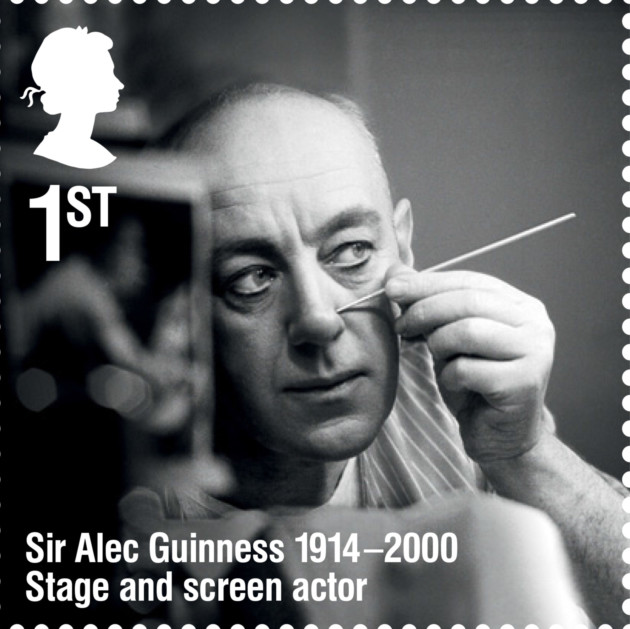
The achievements of stage and screen actors Sir Alec Guinness and Kenneth More are among those recognised in this set. Guinness had an extraordinary film career that included an Oscar win in 1957 for The Bridge on the River Kwai and is also remembered for his portrayal of Obi-Wan Kenobi in the original Star Wars trilogy, while More was one of the most popular British and international stars from the late 1950s to the 1970s.
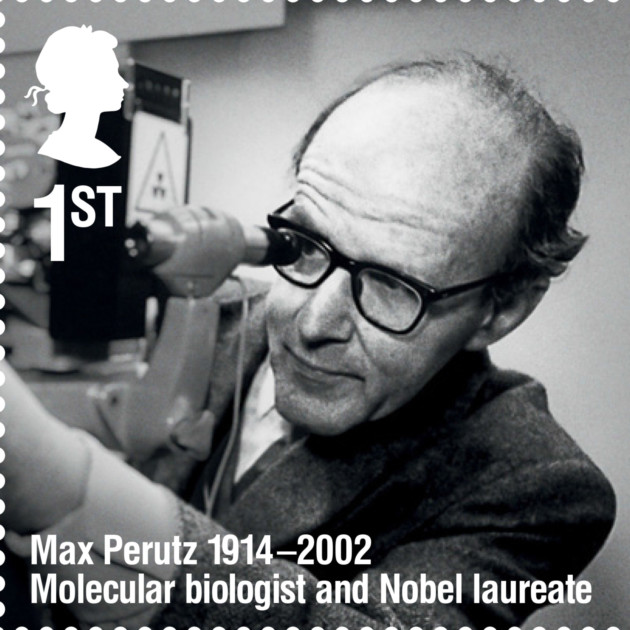
Also celebrated in the issue is Welsh poet and writer, Dylan Thomas, acclaimed for the radio drama Under Milk Wood and for poems such as ‘And Death Shall Have No Dominion’ and ‘Do Not Go Gentle into That Good Night’.
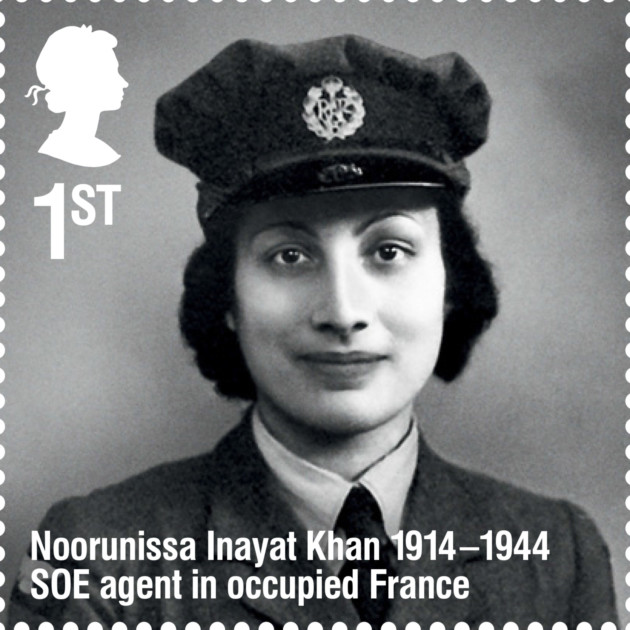
The world of sport is represented by football player and manager, Joe Mercer. Mercer played club football with Everton and Arsenal and also won five full caps for England. Mercer’s management career included spells at Aston Villa and Manchester City. He was also interim manager of England for a brief period in 1974. Voted Footballer of the Year in 1950, he was awarded an OBE in 1976.
Economist, broadcaster and pioneer of global environmental issues, Barbara Ward also features in the set, as does Noorunissa Inayat Khan – who worked for the British Special Operations Executive (SOE) as a wireless officer in Paris during 1943.
Another inclusion is molecular biologist and Nobel laureate Max Perutz. Perutz who devoted most of his life to the study of haemoglobin shared the Nobel Prize in 1962 for work on the structures of haemoglobin and globular proteins.
Broadcaster and writer Roy Plomley is also celebrated alongside theatre director and writer Joan Littlewood. Plomley was the creator and original presenter of Desert Island Discs when the radio programme first aired in 1942 and remained at the helm of the popular show for 43 years. He was awarded an OBE in 1975. In 1963, Littlewood directed the internationally acclaimed Oh What a Lovely War – a play seen as a pioneer of its time and recently revived at the London theatre it originally opened in over 50 years ago.
Completing the issue is pioneering graphic designer Abram Games, whose work helped inform the nation about the importance of supporting the war effort. He created nearly 300 posters and went on to become the only official War Office Poster Artist. He was awarded an OBE in 1957.
Andrew Hammond, Royal Mail Director of Stamps and Collectibles, said: “The ‘Remarkable Lives’ stamp issue creates a great sense of history, and captures both the achievement and endeavour of these exceptional people.”
Stamp by Stamp
Roy Plomley
1914–1985
Broadcaster and writer
Surrey born Roy Plomley took Desert Island Discs on air in 1942. His simple, elegant idea was to invite guests from different professions and spheres of public life to select eight pieces of music – the ‘discs’ – that they would want with them if stranded on an imaginary Caribbean island. The radio show, introduced with the theme tune ‘By the Sleepy Lagoon’, came to British households in the midst of the Second World War, offering a much-needed insight into lives lived beyond the everyday. Plomley presented the programme for 43 years. On the guest list were many notables, including royalty and five prime ministers, and Plomley himself was a ‘castaway’ twice. He was awarded an OBE in 1975.
Barbara Ward
1914–1981
Economist and broadcaster
Barbara Ward saw that for the world to survive and to thrive, fair sharing of resources and wealth was imperative. With her husband Robert Jackson, an administrator for the United Nations, she observed significant projects in India and Africa, where she realised the importance of economic relationships between established and emerging countries. A passionate and powerful intellectual, as well as a prolific writer and lecturer, Ward worked tirelessly to influence policy makers, persistently reminding them of their international responsibilities. In 1974 she was made a Dame of the British Empire and two years later became Baroness Jackson of Lodsworth.
Joe Mercer
1914–1990
Football player and manager
Joe Mercer embodied charm, sporting values and humble good humour combined with great skill throughout a 50-year career in football as player and manager. Seemingly always smiling the Wirral born footballer was a distinguished competitor for England, Everton and Arsenal, captaining the latter team in two FA Cup finals and two League championships. After retiring from the pitch, Mercer managed Sheffield United, Aston Villa and Manchester City, leading this last team to victory in the FA Cup, European Cup Winners’ Cup and Football League Cup. He was voted Footballer of the Year in 1950 and awarded an OBE. The legacy of ‘Uncle’ Joe Mercer lies in how fondly and respectfully he is remembered by many in the sport.
Kenneth More
1914–1982
Stage and screen actor
Kenneth More was the actor who made the character of the middle-class Englishman his own. His career was founded upon carefully crafted roles which explored this seemingly banal individual, to communicate comedy and tragedy equally well. More starred in several highly regarded films and television series, including Doctor in the House, The 39 Steps, The Forsyte Saga and Father Brown, and was one of the most popular British and international stars from the late 1950s through the 1970s.
Dylan Thomas
1914–1953
Poet and writer
In his short life, Dylan Thomas navigated a stormy course through modern literature, evoking the brilliance and pathos of human existence along the way. With rich imagination, he crafted poems, prose and drama presenting universal visions of everyday lives. Thomas’s most well-known text is the radio drama Under Milk Wood, which was later filmed starring Richard Burton, Elizabeth Taylor and Peter O’Toole. He gained a reputation as a flamboyant saloon-bar poet on the London scene, but also wrote scripts for the Ministry of Information and the BBC and tirelessly performed his work (and that of others) for radio.
Sir Alec Guinness
1914–2000
Stage and screen actor
Sir Alec Guinness first acted on screen in 1946, in Great Expectations for David Lean, beginning an extraordinary film career that would see him cast in a multitude of roles. Guinness’s many memorable performances range from a colonel in The Bridge on the River Kwai to several mischievous personalities in dark comedies made by the quintessentially British Ealing Studios. The London born actor won an Oscar in 1957 and an Academy Honorary Award in 1979. Guinness was made a CBE in 1955, knighted in 1959 and made a Companion of Honour in 1994.
Noorunissa Inayat Khan
1914–1944
SOE agent in occupied France
Noorunissa Inayat Khan became one of the silent heroes of the Second World War. With the code name ‘Madeleine’, she worked as a wireless officer for the British Special Operations Executive (SOE) in Paris during 1943, when the city was occupied by Nazi forces. She evaded capture far longer than expected in her role and continued to send important messages to London to aid the French Resistance. She was betrayed, arrested and interrogated, but she refused to give up her secrets. She was executed at Dachau by the Gestapo in September 1944. She was posthumously awarded the French Croix de Guerre and the British George Cross, one of only three women to receive the latter award for service during the Second World War.
A memorial to her in Gordon Square Gardens, London was unveiled by the Princess Royal in 2012.
Max Perutz
1914–2002
Molecular biologist and Nobel laureate
Max Perutz devoted most of his working life to the study of haemoglobin – more precisely, to finding the position of the 10,000 atoms that make up its structure and to explaining how it acquires an appetite for oxygen and is induced to release it. For demonstrating how X-ray crystallography can be used to determine the structure of a protein, he shared the Nobel Prize with John Kendrew in 1962. Later in life, Perutz turned to the study of Huntington’s disease. He was made a Companion of Honour and received the Order of Merit; he also won the Lewis Thomas Prize for his writings on science.
Joan Littlewood
1914–2002
Theatre director and writer
Joan Littlewood revolutionised British theatre after the Second World War by making the classics immediate and by turning raw material relevant to its time into productions of international acclaim. Chief among them was the eye-opening First World War entertainment Oh What a Lovely War.
Littlewood was born in a working-class district of south London. She left the Royal Academy of Dramatic Art early, and with Jimmie Miller (later known as Ewan MacColl) she founded the agit-prop-inspired Theatre Union in Manchester. After the Second World War, aiming to bring a fresh kind of theatre to a new audience, the company toured the UK and Europe as Theatre Workshop before settling in 1953 at the run-down Theatre Royal in London’s East End.
Abram Games
1914–1996
Graphic designer
Abram Games designed almost 300 posters, which became artworks for all. His work helped to inform the nation about the importance of supporting the war effort by growing food and avoiding careless talk, and he designed posters for travel and new products. He created the symbol for the 1951 Festival of Britain, thus giving the nation a witty and patriotic design for use on every possible object, from buildings to stamps. Games may be best known for his visual inventiveness, which drew on the influence of European modernism. He had a passion for product innovation: he designed a coffee maker, a circular vacuum cleaner and a portable duplicator. Games was awarded an OBE in 1957 and appointed Royal Designer for Industry in 1959. His works, familiar and intriguing, have become part of Britain’s visual history.
For almost 50 years, Royal Mail’s Special Stamp programme has commemorated and celebrated events and anniversaries pertinent to UK heritage and life.
The stamps and stamp products are available at all Post Office branches, online at www.royalmail.com/remarkablelives and from Royal Mail Tallents House (tel. 08457 641 641), 21 South Gyle Crescent, Edinburgh, EH12 9PB.

